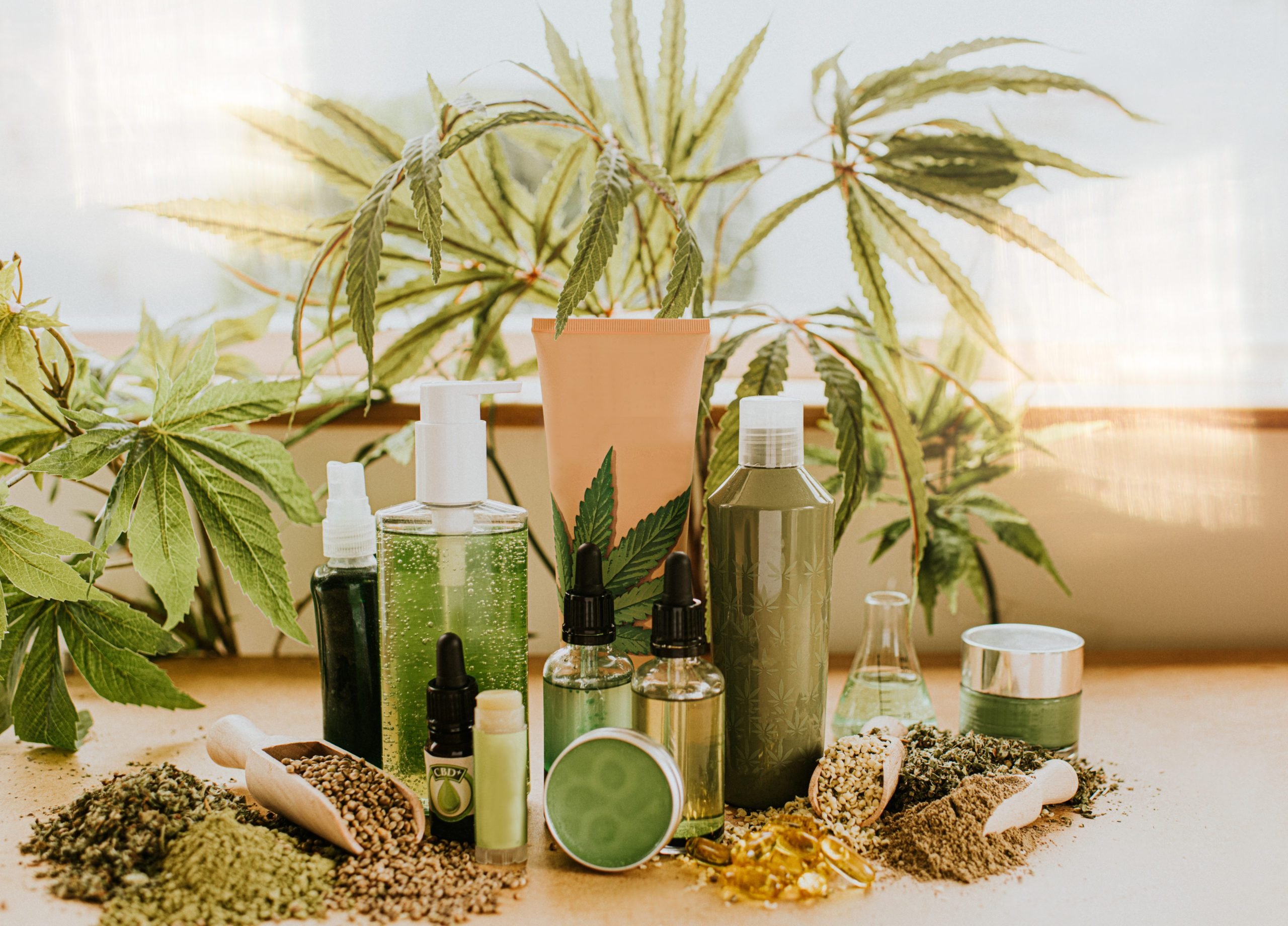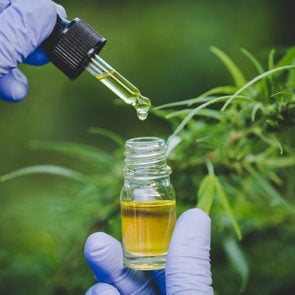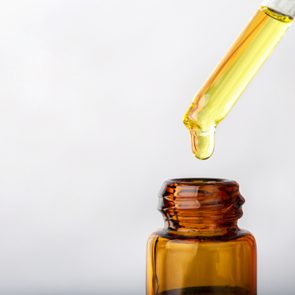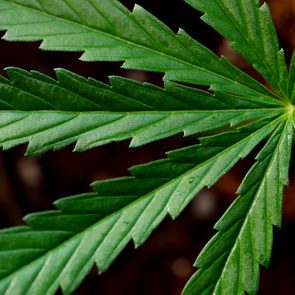What Is CBD? A Guide to CBD, What It’s Used For, and More
Updated: Feb. 26, 2021
The market is booming with CBD-containing drinks, creams, and oils. Here's what experts want you to know about the risks, benefits, and efficacy of CBD products.
On This Page
The popularity of CBD
Whether it’s stress, migraines, chronic pain, or insomnia, there are many times people try using cannabidiol (CBD) to see if it will help. Although the science isn’t always strong for the safety and efficacy of CBD for a condition—and in some cases, the science doesn’t exist at all—that doesn’t stop people from trying it.
Martin A. Lee, co-founder and director of Project CBD, a California nonprofit that promotes CBD research, and author of Smoke Signals: A Social History of Marijuana–Medical, Recreational, and Scientific stopped counting the number of CBD brands when it topped about 3,200.
A 2020 Consumer Reports survey found that almost one-third of American adults had tried CBD in the past two years.
Now you can find CBD in oils, gummy bears, chocolate, coffee, eye drops, gloves, and much more. Coca-Cola has considered launching a line of CBD-infused beverages, and Constellation Brands, which makes Corona beer among other beverages, has invested in a Canadian cannabis producer. (Learn more about CBD edibles.)
The CBD drinks segment alone is expected to exceed $1.4 billion by 2023, according to market consultancy firm Zenith Global.
What is CBD?
CBD, or cannabidiol, is a compound that comes from marijuana or hemp plants. On its own, CBD does not make you high. The other main ingredient in the marijuana plant, delta-9-tetrahydrocannabinol (THC), is the one that can alter your mental state.
Typically, CBD products contain very little or no THC. (Here’s more on the differences between CBD vs. THC.)
That’s because CBD most often comes from the hemp plant, which is a cousin of the marijuana plant. (They’re both Cannabis sativa.) Since the Farmers Bill was passed in 2018, farmers have been allowed to legally grow hemp as long as it contains 0.3 percent or less THC.
The passing of the bill, says Lee, was a result of the growing interest in CBD.
Why are people so interested? CBD is thought to mimic naturally occurring cell-signaling molecules in the body known as endocannabinoids, or endogenous cannabinoids. The body’s endocannabinoid system plays a role in regulating sleep, appetite, mood, metabolism, pain, and other bodily functions.
Is CBD legal?
Most states (36 states at this point) have legalized CBD, but it’s still illegal in the rest of the country and at the federal level. The National Conference of State Legislatures keeps a list of where CBD is or is not legal.
CBD and other derivatives of marijuana are still on the Drug Enforcement Administration list of Schedule I controlled substances. That means there is no accepted medical use (except for some types of childhood epilepsy, which we’ll get to in a minute) and there is a high potential for abuse.
Being legal is not the same as being regulated.
The U.S. Food and Drug Administration (FDA) does not regulate CBD products which means the vast market of CBD products stays largely unregulated.
The one exception is a prescription CBD-based drug, called Epidiolex, which is approved for use in treating rare forms of epilepsy in children. That drug is regulated by the FDA.
Is CBD safe?
Most experts agree that CBD is generally safe, though there are a few things you need to know. One is that CBD can interact with many different medications, including everything from blood thinners to over-the-counter pain relievers like ibuprofen.
Check with the National Institutes of Health’s National Library of Medicine (NLM) to see if any medications you’re taking are on the list of potential interactions. Also, the site notes that if CBD is consumed with alcohol, fat-containing foods, or milk, the amount that’s absorbed could be higher than normal and it could have more side effects.
CBD’s side effects—particularly at higher doses—can include drowsiness, fatigue, dry mouth, low blood pressure, diarrhea, and in some cases, liver problems.
There’s also the possibility a product might be contaminated with substances not listed on the label, or contain more or less CBD than it says it does. The CBD market is unregulated, although there are some things to look for that can help guide you to more reliable products. (More on that later.)

Types of products
CBD products come in four general categories: those you can inhale (CBD vaping), those you can rub on (creams), those you ingest (CBD gummies, capsules, chocolate, and other edibles), and sublingual products you absorb under your tongue, says Lee. They differ in how long they take to kick in and how long they act, among other things.
Each of these products comes in three forms depending on their ingredients:
Full-spectrum CBD: These products contain all of the components of the hemp plant, including CBD and also small traces of THC and terpenes, which are plant compounds.
Broad-spectrum CBD: They contain all of the components except THC.
CBD isolates: CBD isolates products only contain CBD.
Project CBD recommends opting for full spectrum or broad spectrum products as the ingredients tend to work together to create what is called the “entourage effect.”
Full-spectrum CBD products can contain enough THC that may be detected in a hair or urine test. If you’re concerned about failing a drug test, it’s best to opt for other types of CBD that only include trace amounts of THC or none at all.
(Learn more about CBD and drug testing.)
Research before you buy
Your best bet is to work with a licensed dispensary in a state where CBD is legal, or to consult with a specialized medical professional. It’s still possible to find good products on your own, though, as long as you’re prepared to dig in with research.
Only buy from a company that has a website and phone number where you can call and ask questions, advises Bonni Goldstein, MD, medical director and owner of Cannacenters, a medical practice in Los Angeles, and author of Cannabis is Medicine: How Medical Cannabis and CBD are Healing Everything from Anxiety to Chronic Pain.
You definitely need to get a certificate of analysis (COA) on the product. This is a list of the ingredients confirmed by an independent, third-party lab.
If you can’t find it on the website, ask for it, or use a QR code (if there is one) to access the information. Finally, choose U.S.-grown products. This reduces the risk of contamination, explains Dr. Goldstein.
Here’s a look at how many people use CBD for specific conditions.
CBD and epilepsy
While the scientific evidence for CBD’s effectiveness lags for many conditions, that’s not the case for epilepsy and seizures, which is why the drug Epidiolex received FDA approval in 2018.
There is robust research that demonstrates CBD’s efficacy for treating certain rare types of epilepsy in children, says Dr. Goldstein.
CBD for anxiety and stress
Right now, most of the data on CBD for other conditions comes from animal and lab studies (rather than humans), or anecdotal reports, says Sara Jane Ward, assistant professor of pharmacology at Temple University Lewis Katz School of Medicine in Philadelphia.
Many people turn to CBD in hopes that it will ease their stress and anxiety, but there aren’t substantial enough studies to back up those reports. (That’s just one of the things doctors want you to know about CBD for anxiety.)
In fact, the FDA has sent warning letters to some CBD companies that make claims about treating anxiety and other conditions because there’s no scientific evidence that they actually do.
However, CBD oil may affect your brain’s serotonin system. Serotonin is a chemical in the brain that helps regulate mood. Keep in mind that CBD and anti-anxiety drugs may interact dangerously so check with your doctor before taking CBD.
Doctors caution that CBD products aren’t a substitute for medication or therapy.
CBD for pain
In a survey of more than 2,400 people who use CBD products, chronic pain was the No. 1 reason they used CBD.
There’s research to suggest that CBD can ease inflammation and can affect pain perception. But nearly all studies have been done in labs with animals. Small studies found CBD helped some patients with chronic pain or difficult-to-treat pain from nerve damage.
A 2020 study of 400 patients with non-chronic cancer pain in New Zealand found they reported less pain, better sleep, and improved quality of life while using CBD (which is legal by prescription). The findings were published in BJGP Open.
If you’re considering CBD for pain, here’s a look at some options:
- CBD oils for pain
- CBD creams for pain
- CBD capsules for pain
- CBD patches for pain
- CBD sprays for pain
CBD for migraines
Along with pain medication and lifestyle changes, some people try CBD for migraines. Some research suggests that taking CBD may help prevent migraines, while topical CBD oil may also ease the pain of these painful and debilitating headaches.
Many animal and lab studies support the possible use of CBD and other cannabis components for the use of migraine pain, according to a study published in 2018 in the Journal of Headache and Pain.
In a poll of more than 2,000 people who used medical cannabis, researchers found one-quarter were using marijuana for headache or migraine.
If you want to consider trying it, here are various CBD products to try:
CBD for arthritis
It can be challenging to ease the pain and stiffness of arthritis, so many people try CBD. In a poll by the Arthritis Foundation, 29 percent of people said they were using a CBD product to deal with current arthritis symptoms and many more had used it earlier or were considering trying it.
The scientific evidence for CBD and arthritis has been minimal. For a 2015 study in Arthritis Care & Research, researchers analyzed four small studies in humans and found there was only modest evidence that CBD might help rheumatic diseases. There’s been more encouraging research in animal and lab studies, including one in the European Journal of Pain which found that CBD gel decreased joint inflammation and pain in rats with arthritis.
The Arthritis Foundation advises that if you decide to try CBD that you don’t stop using any disease-modifying anti-rheumatic drugs (DMARDs) you may be taking for inflammatory forms of arthritis like rheumatoid arthritis.
CBD and sleep
Many people are looking for ways to battle insomnia. In addition to medications, supplements, and new sleep hygiene routines, some people turn to CBD for better sleep.
There isn’t much scientific evidence that CBD helps with sleep. A review published in 2017 in Current Psychiatry Reports points to studies showing that CBD may be somewhat helpful in treating sleep apnea, REM sleep behavior disorder, excessive daytime sleepiness, PTSD nightmares, and sleep issues in people with chronic pain.
Most reports that CBD helps with falling asleep or staying asleep are anecdotal, researchers say. But if it helps them sleep, doctors say that’s what matters. (Here are CBD products for sleep.)
Personal stories
Some people say that CBD has helped them with specific symptoms. Here are their stories.



















